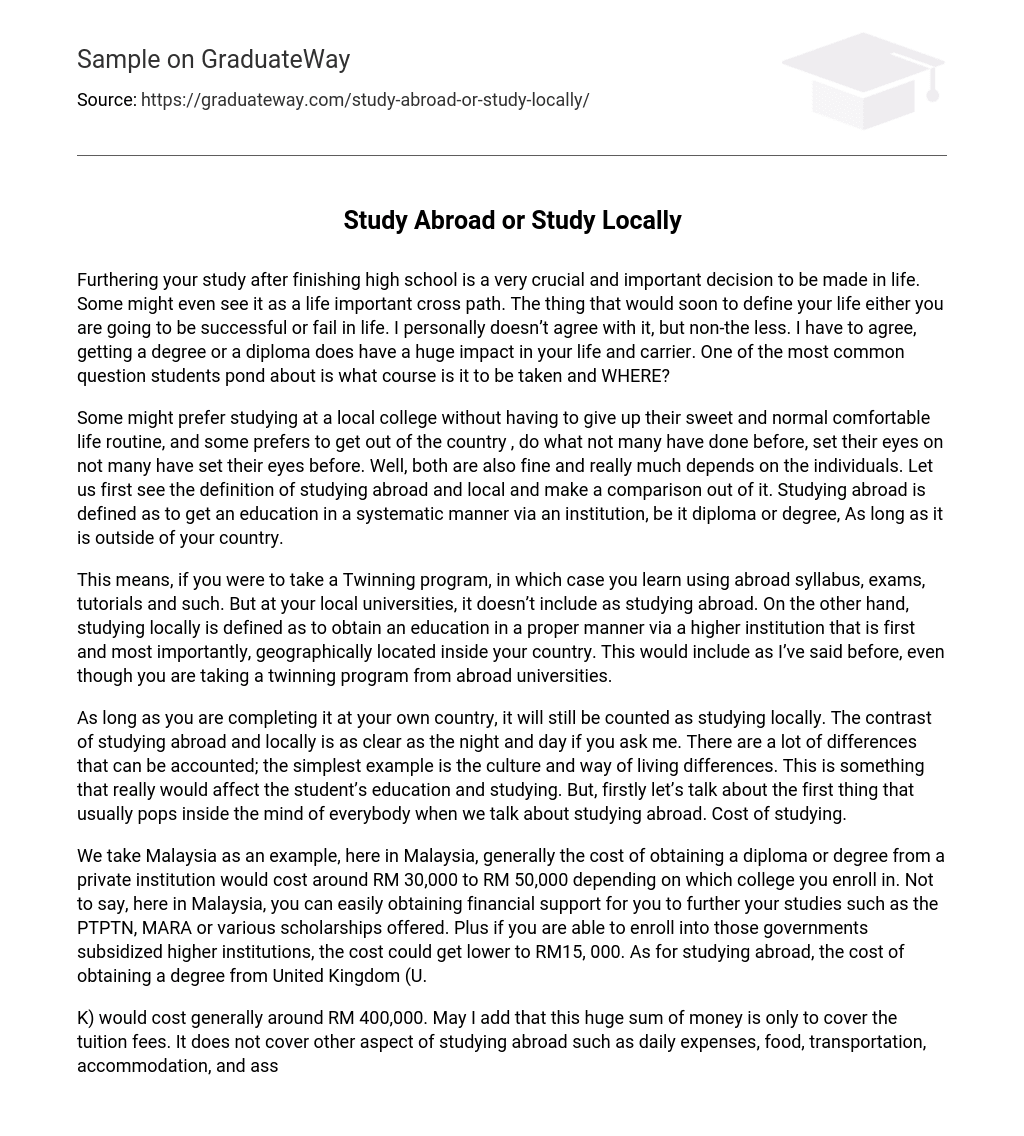Choosing to pursue further education after high school is a crucial decision that holds great significance. It is frequently regarded as a pivotal moment with the ability to mold an individual’s future achievements or setbacks. Although I have my own reservations about this notion, I acknowledge the substantial influence that obtaining a degree or diploma can have on both personal and professional aspects of one’s life. Students often encounter a common dilemma when deciding which course to undertake and where to pursue it.
Some individuals may opt to study at a local college while maintaining their familiar and comfortable lifestyle. Others may prefer to venture outside of their country and explore new opportunities that few have experienced before. Both choices are acceptable and ultimately depend on personal preferences. To begin, let us examine the definitions of studying abroad and attending a local institution, and then compare the two. Studying abroad entails pursuing education in a structured manner through an institution, whether it be for a diploma or degree, as long as it is in a foreign country.
If you participate in a Twinning program, you will be studying with a curriculum, exams, tutorials, etc. from abroad. However, studying at your local universities is not considered studying abroad. Studying locally means getting an education from a higher institution located within your country. This includes twinning programs from universities abroad.
Studying in your own country, which is known as studying locally, has clear distinctions compared to studying abroad. The disparities include cultural and lifestyle factors that significantly affect a student’s educational journey and learning experience. However, let’s address the foremost concern surrounding studying abroad: the cost.
The cost of earning a diploma or degree from a private institution in Malaysia usually falls within the range of RM 30,000 to RM 50,000, depending on the specific college. However, there are multiple financial support options available here including PTPTN, MARA scholarships. If you opt for government-subsidized higher institutions, the cost can be reduced to RM 15,000. Conversely, pursuing a degree abroad in the United Kingdom tends to be costly.
K) The cost for studying abroad is typically approximately RM 400,000. It should be emphasized that this sum solely encompasses tuition fees and excludes other costs such as daily expenses, food, transportation, accommodation, and assignments. Considering these supplementary factors, the total amount required would be nearly RM 500,000. In previous times, our nation’s education system lagged considerably behind the western countries; however, with our country’s rapid progress in striving to become a first world nation, the disparities between us and the west are swiftly diminishing.
Today, it is clear that both local and foreign universities offer comparable general facilities. Although some local colleges may lack these amenities, with a few not even having their own campus, distinguished Malaysian universities like Universiti Malaya (UM) and Universiti Sains Malaysia (USM) excel in providing facilities that are similar to those found in foreign universities.
The presence of a multi-purpose stadium, sports field, and housing for lecturers and students establish a small community within a larger campus. This promotes an environment conducive to education and ensures equal facilities for both local and international universities. Job prospect encompasses the likelihood of job availability and the individual’s qualifications to secure one. Two key factors influence job prospects: personal abilities and qualifications, as well as the availability of specific jobs.
The importance of both qualifications and presentation should not be underestimated when applying for a job. Whether you graduated locally or abroad should be considered equally. In industries like insurance and banking, employers may not prioritize fresh graduates from overseas as their top choice for hiring. They still compare them to local first-class graduates to determine the better candidate. This is due to the significant improvements in Malaysia’s higher education system, with many local students obtaining qualifications from abroad.
Graduating from a local university can have the same benefits as graduating from abroad. Some employers prefer hiring local graduates due to their loyalty and lower demands. Ultimately, the location of your graduation does not greatly impact job prospects. While attending prestigious institutions like Harvard can enhance your resume, don’t despair if you graduated from a local university. The crucial factor is effectively presenting yourself in interviews and staying positive as there will always be job opportunities.
Both studying in the local area and studying abroad have their own advantages and disadvantages, similar to many other things. Ultimately, the decision between the two options relies on the individual. Studying locally provides benefits such as safety, affordability, and parental performance monitoring. Nevertheless, it may also hinder students from stepping out of their comfort zones and fully realizing their capabilities.
Studying in a foreign country offers students the chance to cultivate independence, venture into uncharted territory, and test their limits. Nonetheless, it also exposes them to the risk of making mistakes and losing direction without any guidance. Additionally, difficulties such as adapting to a new culture and overcoming language barriers can add complexity to the learning process. Therefore, students should carefully consider their choices before determining the optimal path forward. Ultimately, both local and international education provide priceless advantages.





